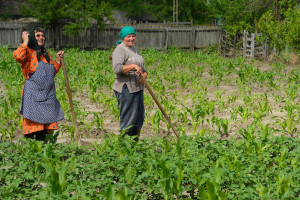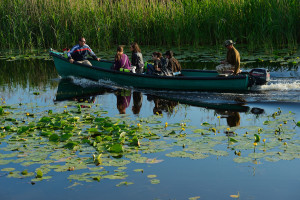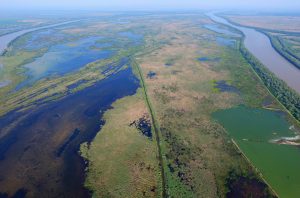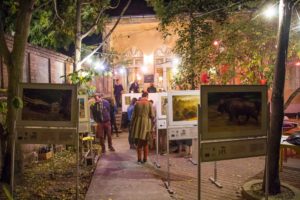Rewilding isn’t only about nature – it’s about people too. The support, trust and passion of local communities will always be vital to the success of rewilding projects, regardless of scale and location. Gaining that support means ensuring that people can earn a fair living from the wild, and reaching out and building relationships through effective stakeholder communication.

Wildlife and wild nature are now in decline across much of Europe, with many habitats impacted by unsustainable commercial practices in agriculture, forestry, mining and fishing. This decline is compounded by socio-economic trends, which in many of Europe’s rural areas are characterised by land abandonment, rural exodus and fading cultural tradition. Through its work and results in operational areas, Rewilding Europe is today demonstrating that rewilding can reverse this negative dynamic.
By generating significant new business opportunities, jobs and income for local people of all ages and backgrounds, it can provide a viable and sustainable alternative to the economic status quo, and help communities retain their cultural integrity.

Very often, getting communities interested and invested in rewilding is all about effective communication and genuine dialogue. If done well, this can bring people together, pre-empt problems, and generate synergy and a sense of pride. “Communication can engage everyone from potential donors through to local schoolchildren,” says Rewilding Europe’s Communications Manager Mei Elderadzi. “But it’s about more than just articles in magazines or social media. Face-to-face discussions, gatherings and meetings are absolutely critical, especially in the areas where Rewilding Europe works.”
Delta outreach
Situated in eastern Romania and southwestern Ukraine, the Danube Delta is a natural paradise in the truest sense of the term. As one of Europe’s most extensive wetlands, it is home to over 5,000 animal and plant species, including endangered migratory birds such as the great white pelican, the natural icon of the region.
With as little as 15,000 human residents, the delta is sparsely populated by man. Local communities are made up of myriad cultures and ethnicities, but all share one common trait – a strong bond with their local environment. People here love the wild nature that surrounds them, but suffer from a lack of economic opportunity, poor infrastructure and transportation networks, and ageing demographics. Serban Ion, team leader in the Romanian part of the Danube Delta rewilding area, knows the communities of the region intimately. He also knows that making rewilding work in this unique environment is all about developing a mutually beneficial relationship between a land and its people.
“For Rewilding Europe working on this dynamic has been both a challenge and an opportunity,” he says. “Many communities have had disappointing experiences with NGOs in the past. When someone new arrives, they’re naturally sceptical.” As he works to gain people’s trust, Ion has developed a simple methodology. “Be transparent at all times,” he says. “Respect the community hierarchy. Don’t overwhelm with information. Above all, be patient and spend time with people, and really listen to them.”
Community conservation

Rewilding Europe has been working to grow nature-based tourism in the Danube Delta, allowing residents to make a living based on the sustainable use of their wild resources. So far this “community conservation” approach has focused on the remote village of Sfantu Gheorghe. Following informal interviews and focus group meetings with Sfantu Gheorghe residents, the Danube Delta rewilding team first drew up a comprehensive stakeholder map.
Illustrating the complexity and dynamic nature of local stakeholder relationships. Working with the Sfantu Gheorghe community the team has created a tourist trail map. Placed in the centre of the village, this has given residents a real sense of pride and a better understanding of rewilding and its benefits. Local entrepreneurs willing to become part of a small-scale tourism association have been identified, with many trained up on how to offer visitors birdwatching tours.
Last but not least, last year also saw the Sfantu Gheorghe community surveyed on the return of the golden jackal to the area. Perhaps a little unexpectedly, many villagers revealed a quiet admiration for the jackal and its capabilities; most were curious to know more about this resilient carnivore, which is now making a comeback across Europe and has recolonised the Danube Delta. “The results of the survey offer good prospects for preempting human-jackal conflict and further development of Sfantu Gheorghe’s nature-based economy based on wildlife watching opportunities,” says Razvan Crimschi, a Rewilding Danube Delta team rewilding officer. As Rewilding Europe looks to step up its rewilding efforts in the delta, which include the reflooding of several areas near the village, the support of the Sfantu Gheorghe community will continue to be essential.
The Ukrainian angle
Rewilding Europe was very excited when the Ukrainian part of the Danube Delta joined our rewilding initiative in 2017, providing huge opportunities for reflooding former polders and islands, introducing natural grazing and reconnecting lakes with the River Danube.

Ukrainian members of the Rewilding Danube Delta team also carried out significant community work in 2017. In Orlovka, a village of around 3500 residents, 150 hectares of wetland was restored and a herd of 14 water buffalo reintroduced. Consultations were held with residents about setting up a community-owned angling collective.
In the 8000-hectare Tarutino Steppe, the only surviving remnant of original steppe habitat left in the Danube Delta (and the second largest area of steppe in the Ukraine), consultations were held with residents of the large village of Veselaya Dolina. Villagers took the decision to have the steppe declared a national park and approved the future reintroduction of kulan (wild ass) as a natural grazer. “The idea is for the community to own the animals,” says Rewilding Ukraine team leader Mykhailo Nesterenko. “They will become emblematic of this beautiful and precious steppe habitat and hopefully encourage wildlife tourism.”
Talks were also held with people from several communities around the Danube Biosphere Reserve with a view to helping nature-based economies here develop further, establishing a forestry park, and potentially reintroducing red deer.
Carpathian connections

In the Southern Carpathians rewilding area in Romania, where Rewilding Europe has been reintroducing European bison since 2014, our approach to community development has focused on creating demand for products and services from visitors. In this way wild nature is increasingly connected to local livelihoods. With experiences in the Southern Carpathians offered through the European Safari Company for the first time in 2017, the visits of around 80 holidaymakers benefitted local residents.
“Over 20 families provided traditional food, accommodation and guiding services to tourists, most of whom had come to see the bison,” says Oana Mondoc, a communications officer attached to the Southern Carpathians rewilding team. “As a result, almost 10,000 euros were spent in the local community. Although this might not seem like a large figure, this demonstrates to local people the potential benefits of wildlife comeback.”
In addition to this, 28 young professionals from six countries undertook field research in the area in 2017, providing part-time jobs to two local cooks for over half the year. A 10-day workshop also saw three local chefs prepare food with ingredients sourced from 10 local producers, while five local drivers ferried workshop participants around. “We still have a long way to go, of course, but 2017 was the year communities around the rewilding area really began to appreciate that there is good business in wild nature,” says Mondoc.
This story was first published in Rewilding Europe’s Annual Review 2017.
